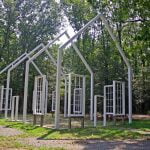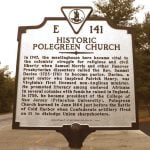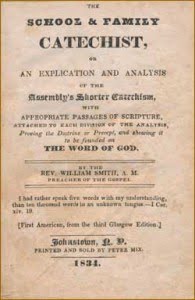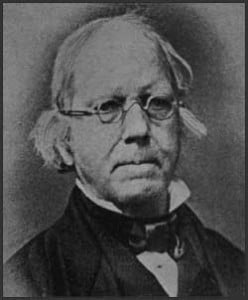The Ghost Church at Polegreen
by Rev. David T. Myers

To the locals, the outline of the white beams of the building is known as “the Ghost Church.” That is because it is neither a building or a monument, but only the outline of a church beside a road leading to Richmond, Virginia. Yet to those “in the know,” this site is both a historic site of religious and civil liberty.
Think back in time to the late eighteenth century. The colony of Virginia was ruled spiritually by the Anglican Church. That was the established religion. But sweeping the colonies was a religious fervor which we know as the Great Awakening. Ministers like Jonathan Edwards, George Whitefield, and Gilbert Tennent were preaching the unsearchable riches of God’s grace in Christ Jesus.
In Williamsburg, Virginia, George Whitefield preached the Word of God. His sermon was soon printed and widely read in Virginia. A Hanover, Virginia brick mason by the name of Samuel Morris gathered his family and some neighbors on Sunday afternoons to read the Bible and various religious tracts, including the sermons of George Whitefield. The gatherings soon attracted others to come together, and these individuals and families became known as “Morris Reading Rooms.” This was the beginning of the Hanover Dissenters. One such “Reading Room,” was known as Polegreen, so named because that was the land of George Polegreen in the late seventeenth century.
A Presbyterian minister preached one Sunday and recommended a young 23 year recently ordained pastor by the name of Samuel Davies. The latter went to the Governor General of Virginia to challenge the “state” religion of Virginia, who responded by setting up four “Dissenter” preaching places. One of them was at Polegreen Presbyterian Church. This became the “flagship church” of Samuel Davies. The gospel went out with much power to the people of the colony, until biblical Presbyterianism was established in the colony, and later on in the state. Polegreen Presbyterian Church became a sacred spot of the history of American Presbyterianism.

Fast forward to the time of the Civil Way in the land, to specifically 1864. General U.S. Grant had begun his eventual crushing Overland Campaign against General Robert E. Lee, of the Confederate States of America. The Union forces fought their way south until they faced each other at Totopotomoy Creek, Virginia. Right in the middle of the two armies was Polegreen Presbyterian Church. When Union sharpshooters occupied the simple building, Confederate artillery opened fire to dislodge this enemy force. One Southern gunner, William S White, of the Richmond Howitzers, fired the shot which set the building ablaze. He confessed later in his diary that his father had been baptized there.
Since then, it has remained just the shell of the building. On the property, there is a stone monument placed in 1929 which reads “Site of Polegreen Presbyterian Church Founded 1748 by Rev. Samuel Davies, Presbytery of New Castle, Synod of New York, seven years before the organization of Hanover Presbytery, 1755. Destroyed June 1, 1864. Erected by Woman’s Auxiliary East Hanover Presbyterian 1929”
Words to Live By:
The outlines of the present “ghost church” were taken from a drawing by Lt. Thomas M Farrell, 15th New York Engineers, in 1862. Of far more importance is the spiritually legacy of Samuel Davies as it is found in evangelical and Reformed churches such as the Presbyterian Church in America, and others which receive the Bible, as summarized in the Westminster Confession of Faith and Catechisms. Are you a member of one of these churches?


